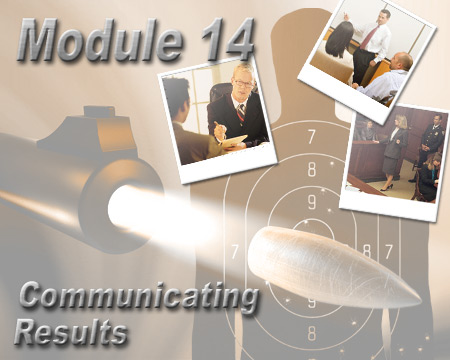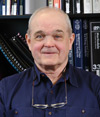Home | Glossary | Resources | Help | Contact Us | Course Map
Aviso de archivo
Esta es una página de archivo que ya no se actualiza. Puede contener información desactualizada y es posible que los enlaces ya no funcionen como se pretendía originalmente.
| Author: John H. Dillon, Jr. |
| Jack Dillon earned a B. S. from the United States Naval Academy and an M. Ed. from the University of Virginia. Commissioned in the United States Marine Corps in 1964, he attained the rank of Captain of Marines. Appointed a Special Agent, FBI, in 1970, he investigated diverse criminal violations, including organized crime, bank robberies, extortions, and kidnappings. In 1976 he received orders to the Firearms/Toolmarks Unit of the FBI Laboratory for training as an examiner, where he evaluated evidence and provided on-site field support in domestic cases, as well as abroad. He also designed and taught basic and management-level forensic courses at the FBI Academy, Quantico, Virginia, 1982-1988. Jack retired from the FBI as Chief of the Firearms/Toolmarks Unit in 1994, and continues to consult in forensic firearm cases and in training design and delivery. |
| Author: Greg Hill |
|
Gregory Hill started his criminal justice career as a patrol officer with the City of Tampa Police Department. Greg received his Bachelor of Arts Degree, with honors, in Criminology from Saint Leo College and a Juris Doctorate degree in 1995 at the State University of New York at Buffalo, School of Law. In private practice, Greg focused on criminal defense law in state and federal courts and served as an Assistant Public Defender in the 13th Judicial Circuit (Hillsborough County, FL), and the 9th Judicial Circuit (Orange and Osceola Counties, Florida). Greg has extensive jury trial experience involving forensic evidence and has provided courtroom testimony instruction to law enforcement agencies, laboratory personnel, and attorneys in the use of scientific evidence. He is a member of the American Academy of Forensic Sciences (AAFS) and associate member of the International Homicide Investigators Association (IHIA) and International Association of Chiefs of Police (IACP). Greg is the AAFS 2007 Program Chair of the Jurisprudence Section Program. |
| Author: Ronald Hill, Ph.D. |
| Ronald Paul Hill has a Ph.D. in business administration from the University of Maryland, College Park, and is the Bank of America Professor and founding dean of the College of Business at the University of South Florida, St. Petersburg. He has authored over seventy-five journal articles on a variety of topics. Areas include environmental management, corporate social responsibility, impoverished consumer behavior, business ethics, and public policy. Outlets for this research include Journal of Marketing Research, Journal of Consumer Research, Business and Society Review, Journal of Business Ethics, Human Rights Quarterly, Organizational Dynamics, Journal of Public Policy and Marketing, and Journal of Management Inquiry . |
Introduction
It is critical that forensic examiners are able to communicate effectively in a variety of circumstances. Good communication is essential in dealing with investigators, writing reports, and providing testimony in court. In this module, effective presentation skills are outlined, as well as guidelines to create and manage written messages.
Objectives
At the conclusion of this module the student should be able to
- choose the ideal modality for message delivery considering the purpose location, and audience,
- describe how to effectively present technical information verbally,
- describe how to organize thoughts before writing,
- describe how to create an extended outline for writing,
- organize papers using bullet points with consideration to flow and style,
- describe what is required for a forensic report,
- describe the guidelines for writing a forensic report,
- know the courtroom structure and personnel within the court ,
- know basic courtroom procedures and protocols,
- define the general rules of evidence, discovery, and admissibility,
- define the general qualifications necessary before being allowed to testify as an expert witness,
- describe the appropriate demeanor and attire while providing testimony,
- describe the courtroom setting and how to present technical testimony and evidence,
- describe the ethical considerations when presenting testimony and the impact of providing faulty or erroneous evidence,
- describe basic techniques for handling hostile attorneys.
AFTE Knowledge and Ability Factors
| 1. | Knowledge of legal search requirements and restrictions governing access to the crime scene and materials that can be legally seized |
| 6. | Knowledge of legal requirements for the preservation of evidence (Chain of Custody) |
| 17. | Knowledge of the proper methodologies for the written documentation of scientific results |
| 18. | Knowledge of how to prepare reports for peer review |
| 21. | Knowledge of testing procedures (protocol) commonly used to examine evidence, the expected results from each, and when to apply each |
| 94. | Knowledge of the types of legal vs. illegal ammunition |
| 145. | Knowledge of legal requirements (e.g., Daubert and Frye cases) and the protocols for the presentation of scientific evidence |
| 146. | Knowledge of appropriate legislation and statutory definitions as applied to the expert witness |
| 147. | Knowledge of courtroom procedures regarding the testimony of expert witnesses |
| 148. | Knowledge of the proper demeanor for testifying in legal proceedings |
| 149. | Knowledge of the preparation and use of demonstrative evidence (such as displays, etc.) |
| 99. | Ability to interpret and present technical results and their significance in lay terms |
| 100. | Ability to look professional and maintain a professional demeanor while testifying in legal proceedings |
| 101. | Ability to listen to and comprehend statements and questions made during legal proceedings |
| 102. | Ability to present effective testimony that is thorough and objective using good communication skills |
| 103. | Ability to prepare and use visual displays in legal proceedings |
| 105. | Ability to advocate only the propriety of the casework that was performed, and not the position of either the prosecution or the defense |
Additional Online Courses
- What Every First Responding Officer Should Know About DNA Evidence
- Collecting DNA Evidence at Property Crime Scenes
- DNA – A Prosecutor’s Practice Notebook
- Crime Scene and DNA Basics
- Laboratory Safety Programs
- DNA Amplification
- Population Genetics and Statistics
- Non-STR DNA Markers: SNPs, Y-STRs, LCN and mtDNA
- Firearms Examiner Training
- Forensic DNA Education for Law Enforcement Decisionmakers
- What Every Investigator and Evidence Technician Should Know About DNA Evidence
- Principles of Forensic DNA for Officers of the Court
- Law 101: Legal Guide for the Forensic Expert
- Laboratory Orientation and Testing of Body Fluids and Tissues
- DNA Extraction and Quantitation
- STR Data Analysis and Interpretation
- Communication Skills, Report Writing, and Courtroom Testimony
- Español for Law Enforcement
- Amplified DNA Product Separation for Forensic Analysts



